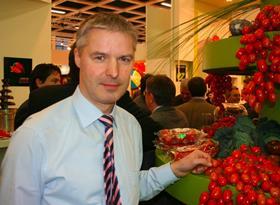
Greater work is required to increase consumer awareness of the role of sustainability and integrated crop management from all sections of the fresh produce sector to differentiate sustainable products and obtain better prices for growers who have invested in these systems.
This is the view of Alexander Tokarz, Syngenta’s head of vegetables, who believes that “productivity” and “profitability” are not incompatible goals with that of achieving sustainable production.
“Consumer surveys show that the typical consumer does not know what ‘sustainability’ in food production actually means,” he told delegates to the Fruit Logistica forum, ‘Sustainable Supply of Fruit and Vegetables’.
“He or she associates it with ‘locally produced’, ‘responsible animal welfare’ and increasingly ‘using less pesticides’ or even ‘organic’.”
However, Tokarz says that retailers and food producers alike are increasingly looking at sustainability more comprehensively, initiating projects such as Rewe’s ‘ProPlanet’ and Sainsbury’s ‘20 by 20’, among others.
For Syngenta’s part, he says the company is currently involved with leading producer-exporters Unica and Univeg to actively promote sustainable production through the co-development of growing systems.
However, although Tokarz estimates that between 70-80 per cent of the current consumption of sweet peppers in Western Europe is produced using integrated crop management systems – combining genetics, chemical and biological protection – the average consumer has “no idea that such systems are in place”.
With this in mind, Tokarz argues that ‘sustainability’, ‘profitability’ and ‘productivity’ have to be viewed as complementary rather than conflicting goals in order to achieve production systems that are “truly more sustainable”.
“We have to continue to deliver innovation for which the consumer is willing to pay,” he says. “This requires joining forces in order to raise the awareness of the consumer, for instance by creating a common branding for more sustainable production systems.”



